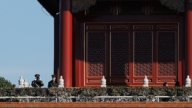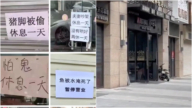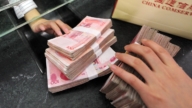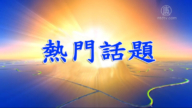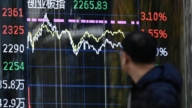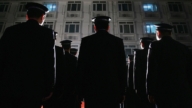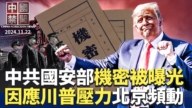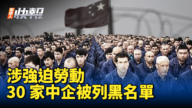【新唐人2014年01月16日訊】日本首相安倍晉三參拜「靖國神社」後,近半個月來,中共發動40多名駐外大使,在國際上掀起了一場轟轟烈烈的輿論戰,連番批駁「軍國主義」是日本不斷作祟的所謂「伏地魔」。但評論認為,中共前政法委書記周永康被傳出事的同時,中共熱炒安倍參拜一事,目前是轉移人們的視線。
2014年10月北京將舉行APEC峰會,中共聲明,不歡迎上個月參拜「靖國神社」的日本首相安倍晉三。接著中共官方媒體,以及中共駐外大使,對安倍的嘲諷和謾罵也逐步升級。
中共喉舌統計,截至1月13號晚,包括駐聯合國代表、駐歐盟使團團長、駐多國大使、代辦、駐多地總領事、特派員等在內,共計有43名中共駐外大使,連番批駁參拜「靖國神社」的安倍晉三。
《京華時報》的報導說,截至11號,中共駐外大使共有40多人次,通過接受當地媒體專訪、或約見當地媒體主要負責人,或召開專門座談會、舉行媒體吹風會、和在公開場合表態等方式,在駐地國聲討安倍晉三。
北京時政觀察人士華頗分析,中共讓這些駐外大使,以當地人的語言發聲,從而掀起的這場轟轟烈烈的輿論戰,是變相的遊說美國及西方政府「提防日本」。
北京時政觀察人士華頗:「其意就是想讓各國,喚起各國對日本在二戰時候的所作所為的記憶,那就是要提防日本,提醒美國及西方不要一味的縱容日本,不要讓日本把日本身上那些枷鎖全部去掉,那就是如果把日本這只虎放出來之後,西方也會倒霉的。」
這場波及全球的輿論戰,最先是由中共駐英大使劉曉明發起。他在英國《每日電訊報》刊文時,借用英國作家JK羅琳在《哈利•波特》中塑造的惡魔,譴責日本是書中的「伏地魔」。接著,中共外交部發言人華春瑩也在記者會上批駁日本「魔性難改」。
日本駐英國大使林景一隨即在《每日電訊報》回應說,安倍晉三參拜「靖國神社」意在表達日本的和平意圖,「不是向戰犯表示敬意,也不是為了讚揚軍國主義。」
他表示,真誠的希望中共能開啟兩國領導人之間的對話,而不是老拿70年前的、早已不復存在的「軍國主義」的陰魂說事。
時事評論員林子旭:「如果說真的要在人類歷史上選出伏地魔的代表,那應該是共產黨和法西斯政權了,見到法西斯和共產黨,或許伏地魔心裡都要打顫的,我相信任何法西斯軍國主義的死灰復燃,都不是愛好和平的人希望看到的。」
台灣《聯合報》認為,中共把這波「輿論戰」擴大到全世界,是奇招。報導說,這是由曾駐日本大使的「日本通」,和中共外交部長王毅策畫,借安倍參拜一事,來突顯日本竊取釣魚島的事實。
自2012年9月,釣魚島被日本「國有化」後,中、日爭端愈演愈烈,除了各自加強警備、強化軍隊外,去年10月,中共還在東海劃設了「防空識別區」,令中、日矛盾進一步激化。
時事評論員林子旭認為,這波「輿論戰」表面看,可以解讀為中共對日本政策有些變化,背後深層原因是中共想轉移視線。
林子旭:「目前周永康出事兒的消息傳的滿天飛,中共內部打得不可開交,中共的各種醜聞伴隨著權鬥紛紛釋放出來了,中共非常不希望老百姓把關注的焦點集中到自己這裡,這個時候日本首相參拜靖國神社,正好給中共提供了一個轉移視線的機會。」
林子旭表示,說白了,中共還是在利用民族情緒,發動全球造輿戰,把人們的注意力都轉移到日本人身上,中共好從中喘口氣。
採訪編輯/李韻 後製/李勇
Communist Regime Calls Japan PM The Voldemort
Since Japanese Prime Minister Shinzo Abe visited the
Yasukuni Shrine, more than 40 ambassadors from the
Communist regime in the international community
have conducted a vigorous propaganda war against Japan
for almost two weeks.
They claim militarism is the Voldemort of Japan.
However, commentators believe this heated debate about
PM Abe’s visit to the Yasukuni Shrine is to divert
attention away from the CCP and Zhou Yongkang’s case.
For the upcoming 2014 APEC summit in Beijing, the Communist
regime has claimed, “Chinese people do not welcome him."
The sarcasm and invective comments from the regime’s media
and ambassadors have also escalated.
The regime-led media reported that as of January 13, a total of
43 Chinese Communist ambassadors have issued criticism of
Japanese PM Abe’s visit to the Shrine.
They are the Communist regime’s UN representative,
Head of Mission to the EU, multinational ambassador, agencies,
consul general, and Commissioner.
Beijing Times reported that, as of the 11th, more than 40 CCP
ambassadors denounced Abe in the resident country in
local media interviews, forums, media briefings, and public
appearances.
Beijing political observer Hua Po analyzes the propaganda war
of the CCP in local languages as a disguised form of lobbying
to Western governments: “beware of Japan".
Hua Po says “It is to summon up memories of Japan’s actions in
World War II to caution the West not to blindly condone Japan,
and not to remove the shackles on Japan.
Otherwise, once this tiger is released,
the West will suffer the consequences."
This global propaganda war was first initiated by China’s
ambassador to Britain, Liu Xiaoming, who wrote an op-ed
in The Daily Telegraph describing Japan as the villain Lord
Voldemort in the Harry Potter series by J.K. Rowling.
The regime’s Foreign Ministry spokesperson Hua Chunying
also denigrated Japan in a press conference.
Japan’s ambassador to Britain, Keiichi Hayashi, replied in
another Telegraph op-ed that Mr. Abe’s shrine visit was meant
as a statement of Japan’s peaceful intentions
“and by no means to pay homage to war criminals or
to praise militarism."
Hayashi expressed his sincere hope that dialogue between
two leaders “will come forward, rather than keep invoking
the ghost of ‘militarism’ of seven decades ago,
which no longer exists."
Commentator Lin Zixu: “The real representatives of Voldemort
in human history, if ever to be elected, should be the communist
and fascist regimes.
Perhaps even Voldemort would tremble seeing the fascists
and communists.
I don’t think any peace-loving people want the resurgence of
fascist militarism."
Taiwan’s United Daily News reported this global propaganda
war of the CCP as a strategy organized by Chinese experts on
Japan and the Chinese Foreign Minister Wang Yi to highlight,
by the debate, how Japan had seized Diaoyu Island.
Since the nationalization of Diaoyu Islands by the Japanese in
September 2012, the two countries’ dispute has intensified.
As well as the enhanced guards and military forces on both sides,
the Communist regime has also unilaterally declared an
Air Defense Identification Zone to further intensify the conflict.
Commentator Lin Zixu interprets the propaganda war as a
shift in the Communist regime’s foreign policy to Japan,
with the underlying purpose of diverting attention.
Lin Zixu: “The constant gossip on Zhou Yongkang’s case,
the struggles within the CCP Central,
the exposure of a variety of scandals have drawn people’s
attention to the CCP against its wishes.
The Japanese PM’s visit to the Yasukuni Shrine serves as
an opportunity for the CCP to divert attention away from itself."
Lin Zixu says that, plainly, the CCP employs national sentiment
to engage the world in this propaganda war and
to shift the focus to Japan so that the CCP gets relief.
Interview & Edit/LiYun Post-Production/LiYong


